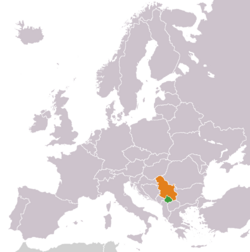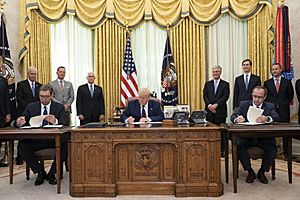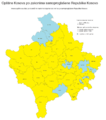Kosovo–Serbia relations facts for kids
 |
|
Kosovo |
Serbia |
|---|---|
| Diplomatic Mission | |
| Liaison Office of Kosovo, Belgrade | Liaison Office of Serbia, Pristina |
| Envoy | |
| Jetish Jashari | Dejan Pavićević |
Kosovo unilaterally self proclaimed independence from Serbia in 2008, a move which Serbia strongly rejects. Serbia does not recognize Kosovo as an independent state and continues to claim it as the Autonomous Province of Kosovo and Metohija. However, differences and disputes remain, while North Kosovo is partially under Serbian rule. Initially there were no relations between the two; but in the following years there has been increased dialogue and cooperation between the two sides.
Though Kosovo is not a member state of United Nations, it remains a partially recognized country, with 104 out of 193 UN member states recognizing its independence. According to the international law, and Resolution 1244, which ended the Kosovo war it is claimed by Serbia as the Autonomous Province of Kosovo and Metohija.
Negotiations facilitated by the European Union resulted in the 2013 Brussels Agreement on the normalization of relations between the governments of Kosovo and Serbia. The agreement pledged both sides not to block the other in the EU accession process, defined the structure of the police and local elections in all parts of Kosovo, and also established the proposal of the Community of Serb Municipalities.
The United States-mediated diplomatic talks agreed on the interconnection of air, train and road traffic, while both parties signed the 2020 agreement on the normalisation of economic relations. Kosovo and Serbia are expected to become part of the single market, known as Open Balkan.
Both parties agreed to a proposed normalisation agreement in EU mediated dialogue in February 2023 and through further negotiations accepted a roadmap and timescale for its implementation the following month.
Contents
2020 Washington Agreement

On 4 September 2020, under a deal brokered by the United States, Serbia and Kosovo agreed to normalise economic relations. The deal will encompass freer transit, including by rail and road, while both parties agreed to work with the Export–Import Bank of the United States and the U.S. International Development Finance Corporation and to join the Mini Schengen Zone, but also to commence rail links between them such as Niš-Pristina and Pristina-Merdare and to connect the Belgrade-Pristina rail network with a deep seaport on the coast of the Adriatic Sea They will also conduct a feasibility study with the U.S. Department of Energy concerning the shared Gazivoda Lake, which straddles the border between the two states. In addition to the economic agreement, Serbia agreed to move its embassy in Israel to Jerusalem from Tel Aviv starting in June 2021 and Israel and Kosovo agreed to mutually recognise each other.
2023 Ohrid Agreement
In December 2022, the European Union forwarded a draft agreement to the authorities in Serbia and Kosovo at the EU-Western Balkans summit in Tirana. The proposed agreement is based on a previous draft drawn up by the French and German governments earlier in 2022. Under the terms of the draft agreement, both sides would agree to "develop normal, good neighborly relations with each other on the basis of equal right" and that "both parties will recognize each other's relevant documents and national symbols, including passports, diplomas, vehicle plates and customs stamps." The draft agreement further adds that Serbia will not oppose membership of Kosovo in any international organizations and Kosovo will form an "appropriate level of self-management for the Serbian community in Kosovo. Both parties will exchange permanent missions in their respective capitals. The proposal also allows for the formation of a joint commission, chaired by the EU, for monitoring its implementation. The EU hopes that the agreement could be signed by the end of 2023 and negotiations regarding the proposed agreement are expected begin in mid-January.
The final text, known as "Agreement on the path to normalization between Kosovo and Serbia", was reported to have been agreed in principle by Kosovo prime minister Albin Kurti and Serbian president Aleksandar Vučić on 27 February 2023 at a meeting in Brussels with EU High Representative for Foreign Affairs and Security Policy Josep Borrell and EU Special Representative for the Belgrade-Pristina Dialogue Miroslav Lajčák. Kurti and Vučić met again on 18 March at Ohrid, North Macedonia and verbally accepted a roadmap for implementation of the agreement.
Council of Europe candidacy
In April 2023, Serbia, along with Azerbaijan, Cyprus, Georgia, Hungary, Romania and Spain, voted against approving Kosovo's membership in the Council of Europe.
Representation
Under the terms of the Brussels Agreement signed in 2013, the governments of Serbia and Kosovo agreed to post liaison officers in each others' capitals. The Government of Kosovo is represented in Serbia by the Liaison Office of Kosovo, Belgrade and likewise the Government of Serbia is represented in Kosovo by the Liaison Office of Serbia, Pristina. Both these missions are hosted by the European Union. Under the terms of the 2023 Ohrid Agreement that was accepted by both parties in March 2023, the liaison offices in each country are to be upgraded to Permanent Missions.
Sport
Kosovo is a full member of several international sporting organizations; this has caused conflict and tension when events are hosted in Serbia when Kosovo is to officially compete as its own country.
Minorities
Since the 1999 bombing of Yugoslavia, a large portion of Kosovo Serbs have been displaced from their homes, like other minorities throughout the province. A significant portion of Serbian Orthodox churches, as well as Serbian cemeteries and homes, have been demolished or vandalised.
The Serbian Government promised suspended Serb prison workers from Lipljan money if they were to leave the Kosovo institutions, which they were working in, so they did. However they were never paid, so staged a continued a blockade of the Co-ordination Centre in Gračanica. They claim that Belgrade, the Kosovo Ministry specifically, has not paid them money promised for leaving the Kosovo institutions.
Serbs have also responded by forming their own assembly.
In September 2013, the Serb government dismantled the Serb minority assemblies in North Mitrovica, Leposavić, Zvečan and Zubin Potok as part of an agreement with the government of Kosovo. At the same time, the President of Kosovo signed a law that granted amnesty to ethnic Serbs in Kosovo for past acts of resistance to Kosovo law enforcement authorities.
Kosovo pays considerable attention to the Albanian minority in Serbia. The Albanian minority in Serbia has voiced support for more rights in line with the rights of Serbs in Kosovo. In 2013, Isa Mustafa, then one of the leaders of opposition in Kosovo, referring to the Brussels Agreement said that "Once the programme for implementing the agreement is finished, Kosovo and Serbia have to open a discussion about the issue of the rights that Albanians who live in Preševo and in Serbia enjoy".
Images for kids
-
Hashim Thaçi, Prime Minister of Kosovo (left), and Ivica Dačić, Prime Minister of Serbia (right), with Michael Spindelegger (middle) in Vienna, 2013.
-
Ivica Dačić, Prime Minister of Serbia (left), and Hashim Thaçi, Prime Minister of Kosovo (right), with Catherine Ashton (middle) in Munich, 2014.
-
Milun Trivunac, State Secretary of the Ministry of Economy of Serbia (sitting left),Richard Grenell, Special US Presidential Envoy for Serbia and Kosovo Peace Negotiations (standing right),Eset Berisha, Director of the Civil Aviation Authority of Kosovo (sitting right)
See also
- Foreign relations of Kosovo
- Foreign relations of Serbia
- Belgrade–Pristina negotiations
- Albania–Serbia relations
- Albania–Kosovo relations
- 2008 protests against Kosovo declaration of independence
- Kosovo Serbs
- Albanians in Serbia
- Serbo-Montenegrins in Albania






